Published Jan 9, 2020
Jean-Luc Picard Was the Father Figure I Needed
How the Captain of the Enterprise shaped my life in profound ways.
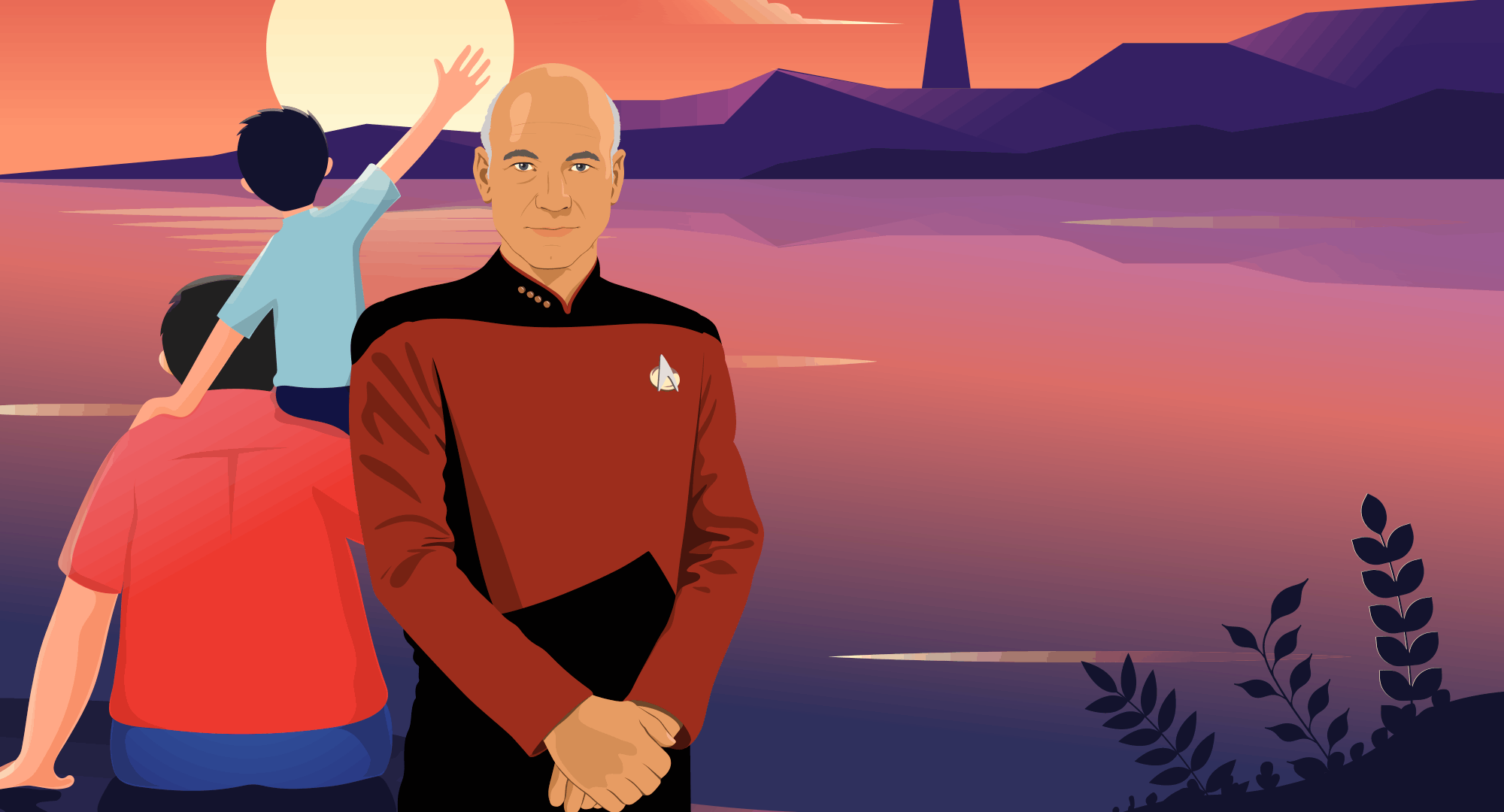
StarTrek.com
As Star Trek: Picard rapidly approaches, I find myself giddy with anticipation for a show that seemed like a pipe dream just over a year ago. I’ve also been reflecting on the profound effect Jean-Luc Picard has had on my life. The captain of the Enterprise-D was more than just a hero to me; he was a formative role model, and often even a parental stand-in.
I grew up in Yorktown, Virginia, home to one of the most important battles of the Revolutionary War, and very little else. I’m the son of a loving, faithful mother and an erratic, distant father. My father had serious substance abuse issues before I was born, which continued into my early years of life. Even after he got clean, my hard partying, sports loving father was never quite sure what to do with his thoughtful, nerdy son.
One day when I was five, my father decided he was going to teach me how to ride a bike. My parents were in the midst of a messy divorce, and my father had just exited rehab. He decided teaching me how to ride a bike was a sufficiently fatherly activity for the both of us, and off we went to a nearby playground. I had no experience on bicycles, and after I fell onto the parking lot pavement the second time, my father decided it was too hard and took me home in tears.
My wonderful, overworked mother — she was often working three different jobs to provide for me and my younger sister — parked me in front of the TV, still sniffling from my bike riding embarrassment. “I think you’ll like this show,” she said, not realizing she was about to change my life.
The show was Star Trek: The Next Generation. My five-year old brain lit up like a Christmas tree at all the science fiction gifts laid out before me. My mind raced with questions: “Who was the guy with the gold skin and yellow eyes? What was the deal with the guy with the forehead ridges? Where can I get one of those cool VISORS?”
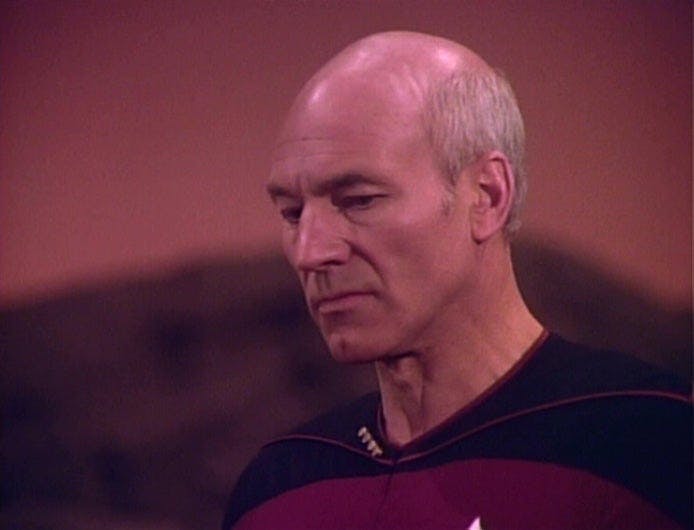
StarTrek.com
But more than anything, I remember Picard. The first episode I saw happened to be “Skin Of Evil,” in which Lieutenant Tasha Yar meets a swift and violent death. I had never really encountered death, not even in fiction (TNG was what I would refer to as my first “grownup show”). I was rattled by Tasha’s death more than was probably warranted for a character I’d never met before, but I felt that sting all the same. And yet as I watched this crew of visibly distraught Starfleet officers, there was this thin, bald man at the center of it all, keeping everyone’s minds on the mission at hand, and then offering a shoulder for them all to cry on when it was time to grieve. It was transformative, and it helped me understand what people are capable of at their best. From that moment on, Star Trek and Jean-Luc Picard would become foundational parts of my life.
I had health problems as a kid, and was limited in the physical activities I could take part in until I was a teenager. My father was clearly disappointed I didn’t play organized sports, and was confused by my interest in things like writing, music, and yes, Star Trek. By the time I was 12, he had remarried to his third wife, an heiress who lived in Columbus, Ohio who demanded he obtain joint custody of his children, which would have required my sister and I to live in another state for half of the year with two people incapable of caring for us. This led to a nasty court battle, and ultimately a threat from me to get on a bus back home at any opportunity led a child psychologist to put the kibosh on my multi-state existence.
Somewhere in my mind, Picard’s actions in “The Offspring” had made an impression. When Starfleet came to take away Data’s daughter, Lal, Picard stood up to authority and refused to hand over the young android. “Order a man to hand his child over to the state? Not while I’m his captain.” That courage inspired me to make my own stand, though it did real damage to my already fraught relationship with my father.

StarTrek.com
Around the same time, Star Trek: The Next Generation was wrapping up its exquisite seven year run, and in many ways the end of TNG marked the end of my childhood. My mother married a man who was the polar opposite of my father. He was a military alum, a man obsessed with details and discipline. While that may sound refreshingly Picard-esque in the wake of my childish, irresponsible father, there was a problem — my stepfather made it clear he had no interest in being a parent to me or my sister. We may have finally had a responsible adult around to help pay the bills, but that was the extant of his warmth.
I harbored hopes that my stepfather would eventually warm to me, like Picard famously did with Wesley Crusher and the rest of the children aboard the Enterprise, but that was not to be. He was never physically abusive — I’m lucky to have avoided that fate from either man — but my stepfather was overly demanding of me in ways that pushed my burgeoning teen angst into overdrive. Chores were never completed to his satisfaction, too much money was spent on us, we had too much freedom to say and do what we wanted for his liking. He made me feel like a constant failure, something I still grapple with in adulthood.
I retreated into my hobbies, with Star Trek near the top of that list. I would discover my personal political awakening with the help of TNG episodes like “The Drumhead,” which found Picard taking on bad faith actors within Starfleet itself. Admiral Norah Satie would attempt to use Picard’s modest personal failings against him, but he had the clarity of mind to understand when he was being manipulated, and rose above the muck to keep both his and Starfleet’s integrity intact. I tried my best to emulate that sort of selfless vigilance, but it was a tall task for an angry kid in the suburbs.
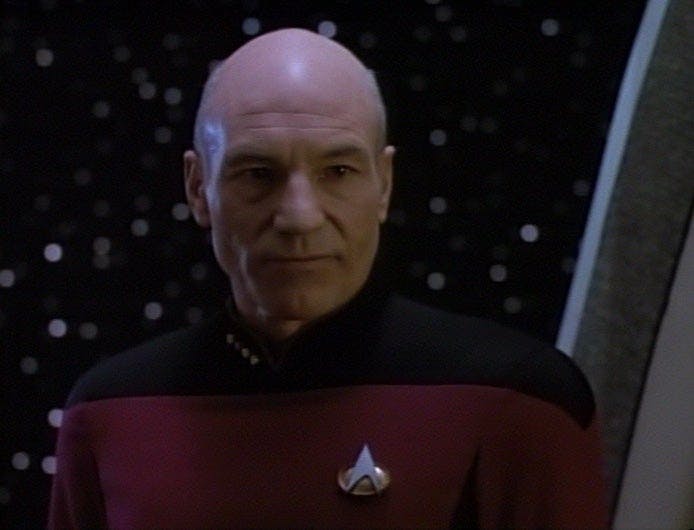
StarTrek.com
As Star Trek was hitting the peak of its popularity with Star Trek: First Contact — still my favorite Star Trek film — my life was hitting new lows, somewhat emulating the dark personal journey Picard would be forced to endure in that Borg-centric film. The empathy and intellectual rigor of Jean-Luc Picard genuinely seemed like science fiction when I was a teenager. I let my dissatisfaction with my home and school life curdle into a sharp-tongued cynicism. I could be a mean-spirited person, and my ability to hurt people’s feelings was a superpower I would learn to hate.
It’s probably not a coincidence that some of the darkest days of my life came in an era when Star Trek was mostly dormant. By 2001, my mother and stepfather had separated, largely due to his inability to co-exist with me. By 2002, my father and I had stopped speaking after he attempted to grift my then dementia-stricken grandmother out of thousands of dollars, a transgression so heinous and selfish I’ve never forgiven him for it.
In 2009, I felt it was time to make a change in my life. Inspired partly by the adventurism and escapism of Star Trek, I quit my photo lab job and moved cross-country to Los Angeles to go to engineering school. It wasn’t exactly Picard leaving France behind for the stars, but I can’t imagine I would have been anymore nervous had my destination been Vulcan instead of Hollywood.
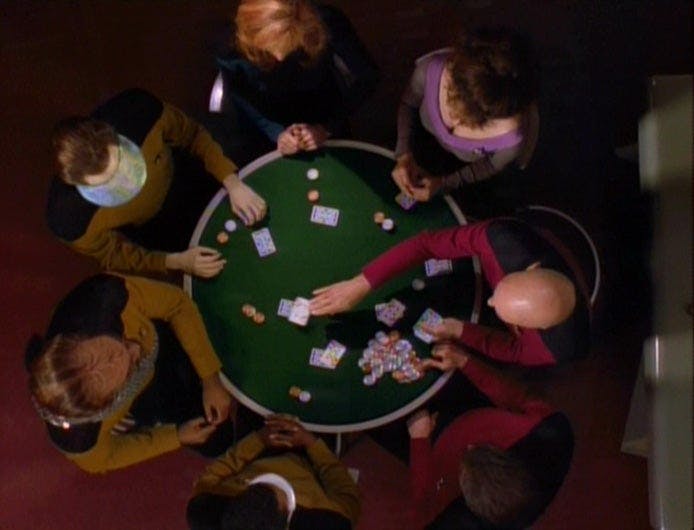
StarTrek.com
I also took the move as an opportunity to recalibrate the way I acted around people. Rather than continue being a cynical grump, I made a genuine effort to act more like Jean-Luc Picard by greeting new people with trust and empathy, which resulted in some of the most important relationships and experiences of my life. Like Picard in “All Good Things...,” I had finally allowed myself to sit at the poker table, let my guard down, and enjoy my friends and family. To paraphrase the good captain, I should have done it a long time ago.
In Los Angeles, I felt like a Starfleet officer on an away mission to a strange, wondrous alien world. It’s difficult to feel like an arty outsider in a town populated mostly by arty outsiders, though the 405 freeway is far more perilous than anything you’d find along the Neutral Zone. My mother and sister followed me out to the west coast a few years later, and for all intents and purposes, California is, like the Enterprise, now my home.
Despite the needed change of scenery, I’ve been personally enduring hard times lately. My health has taken a nosedive, resulting in underemployment and a constant battle to make ends meet while I try to get better. 2019 has been one of the most difficult years of my life, and TNG has once again served as a balm. More than once I’ve thought of the TNG episode “Family,” with Picard still reeling from his assault at the hands of the Borg. He reached his low point after a mud fight with his brother, finally admitting how much pain he was quietly enduring. I’m still in the mud, but I know that I will eventually get out of it and find my way back to the light like Picard.
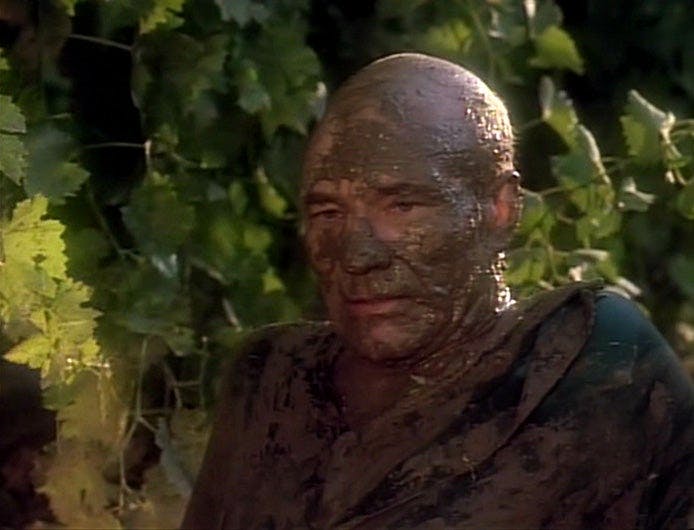
StarTrek.com
Picard is still the model for the kind of person I want to be. His openness to new possibilities, his relentlessly curious mind and, above all else, his kindness were the things I aspired to, and still aspire to. I want to make sure I’m always a positive force in the lives of the people I care about, helping them to move forward and not get bogged down in the misery and anxiety that dominates so many lives today.
My father died in 2013, a suicide brought on by a psychotic break. When he died, I hadn’t spoken to him in well over a decade. I wasn’t distraught or regretful over his death or our estrangement; I largely felt nothing, which in itself was somewhat alarming. But my mother helped me work through that ambivalence, reminding me I had little reason to grieve for the man beyond social norms. I discovered my value system through other, less traditional avenues, and I eventually made peace with the fact that I never had a conventional father figure. It turns out I didn’t need one.
I still don’t know how to ride a bike, but I know who I am thanks to Jean-Luc Picard.
SDCC 2019: Sir Patrick Stewart Gets Emotional
Dusty Stowe is a freelance writer and musician who lives in the Los Angeles area. He writes about Star Trek for Screen Rant and can be found on Twitter at @dustystowe.
Star Trek: Picard streams on Paramount+ in the United States, in Canada on Bell Media’s CTV Sci-Fi Channel and streams on Crave, and on Amazon Prime Video in more than 200 countries and territories.

